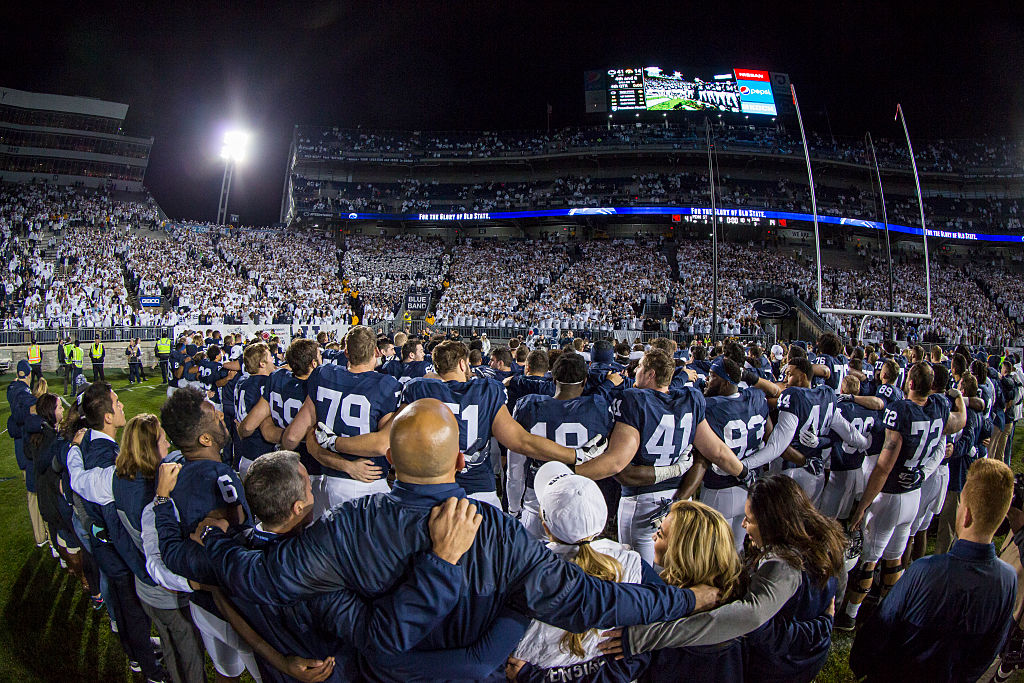College football coaches aren’t shy about discussing the game they coach and dedicate nearly 365 days, 24 hours, seven days a week to. So it should come as no surprise that the annual American Football Coaches Association conference had a few headlines come out of it today.
There are major topics to be figured out in college football, especially addressing the recruiting cycle and the seemingly endless creep into playing games on Friday night. In fact, that latter topic appears to be one of the few things that all college football coaches can agree on — STOP IT.
#AFCA Exec. Director Todd Berry said FBS coaches are in "complete condemnation of Friday night games". Doesn't want to disrupt HS games. pic.twitter.com/ck5uLB8j3P
— AFCA (@WeAreAFCA) January 11, 2017
Friday nights are all about high school football for large parts of the country. Towns shut down, stadiums fill up, and most importantly, college football coaches hit the road to watch games in person.
Perhaps this is the biggest motivator behind it all – getting their faces in front of recruits in today’s crazy college football recruiting environment.
Will college administrators and TV partners listen? That is the ultimate question, and we’re guessing what happens with ratings and advertising dollars will tell the real tale of what happens to Friday night games.
At the forefront will be what happens with the Big Ten, who have added Friday night games as a part of its football season for the first time en masse. Six weeks will have Big Ten teams playing games on Friday nights, with a few conference games and mostly non-conference contests getting
Perhaps a good compromise will be not allowing conference games to be played on Friday nights amongst the Power 5 conferences. As for non-conference games, it is just smart to allow those dates for maximizing exposure and TV ratings. When you don’t have to switch between 10 games and maybe only have to find eight in the early game window on Saturday, that’s a win for your conference’s TV profile.
Friday night games weren’t the only matter on the docket for the coaches, nor the only topic that there appears to be near unanimity on either. It also appears that the college coaches want an earlier signing period to happen after all.
No topic has been hotter in coaching circles than what to do with the overall recruiting cycle, which many believe has changed to be unhealthy for the players, coaches, and college football in general. The basic proposal that the coaches are taking to the NCAA calls for a new early signing date in December, rather than the earlier thought of June signing date.
To clarify: AFCA coaches voted "unanimously" on recommending two signing days." No June date. More to come…
— Dennis Dodd (@dennisdoddcbs) January 11, 2017
"Could that mid-Dec date be the early signing date? Absolutely?" –AFCA exec dir Todd Berry
— Dennis Dodd (@dennisdoddcbs) January 11, 2017
What may be the most amazing thing about this proposal is the fact that nearly everyone got on board.
David Shaw: multiple signing day proposal "near unanimous" Gives Todd Berry credit for lobbying key contributors. Coaches have 1 voice
— Dennis Dodd (@dennisdoddcbs) January 11, 2017
That unanimity certainly helps when the coaches get together with those that actually make the rules of the game, the NCAA.
AFCA's Todd Berry admitted his org has never coalesced around mandate on early signing. Says today sends a clear message to NCAA.
— Dennis Dodd (@dennisdoddcbs) January 11, 2017
This issue is likely to be one that is hot-button for those in the varied committees that will need to approve any changes. Again, will it happen? The voice of those most affected by this certainly should have some sway, and we’re likely to see these changes happen quicker thanks to this vote.
Finally, it appears coaches would like to see some changes to the way eligibility is determined within the NCAA on the football field. As of now, playing in even one game on the year as a freshman pulls any chance of a redshirt.
Of course, players who get injured before playing in 30 percent or three contests, whichever is greater, and are out for the rest of the season can get that year back with a medical hardship waiver.
However, if you are just a regular player and you need to fill a role for one game, there goes your redshirt season.
Coaches would rather see a rule of four games before the redshirt can’t be applied to a freshman or at any point in a career. Basically, five years to play four, but a much broader definition of how a redshirt can be applied.
#AFCA proposes a new eligibility model, still 5 years to play 4, but if athlete plays less than 4 games in a season can be redshirted. pic.twitter.com/AaTufUvHDp
— AFCA (@WeAreAFCA) January 11, 2017
Again, this one had broad support from the coaches in attendance. It also addresses the issue of players who work their tails off in practice not getting the reward of a bowl game appearance and much more.
When coaches and college football writers agree, it is pretty much common sense (trust me on that one).
I think this would be a smart move. https://t.co/GduDP6VU1e
— Bruce Feldman (@BruceFeldmanCFB) January 11, 2017
It is now up to the NCAA to take up these topics and for the coaches to rally their respective administrators and powers that be to make these changes happen. Given the years of debate over early signing periods and eligibility, look for those two to be the main topics taken up at the NCAA governance level soon.







